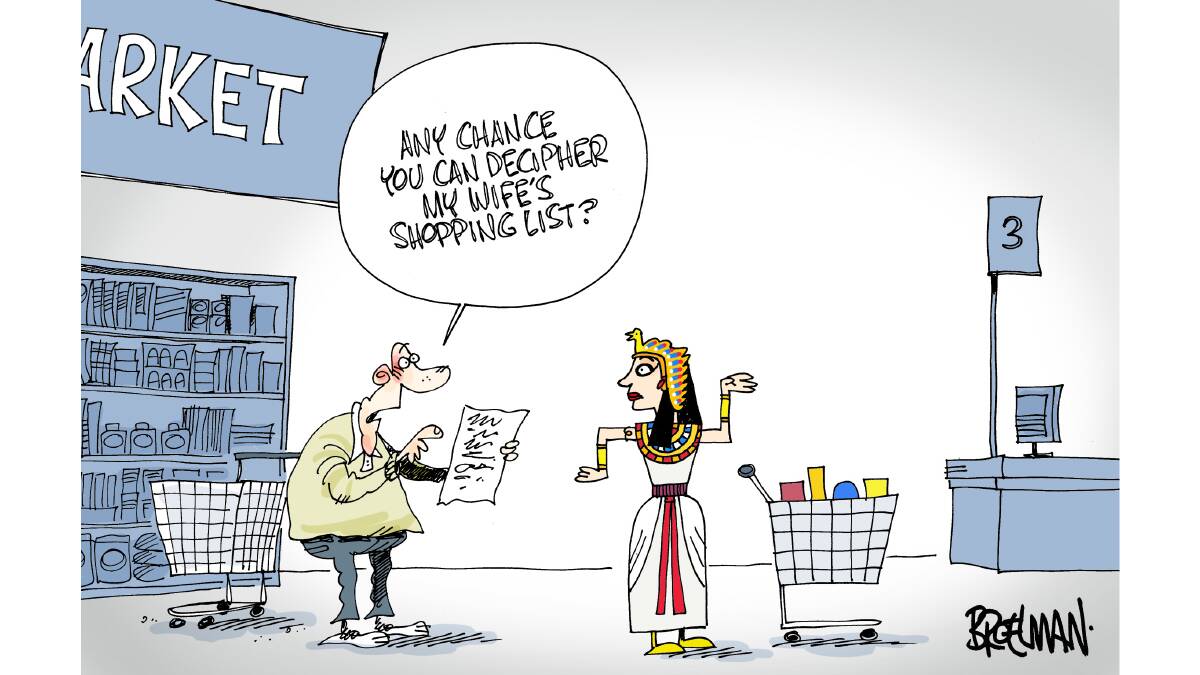This is a sample of The Echidna newsletter sent out each weekday morning. To sign up for FREE, go to theechidna.com.au
Subscribe now for unlimited access.
or signup to continue reading

The crumpled document was indecipherable, a riotous mess of loopy scrawls and paleolithic scribblings that could have been the doodling of a toddler or the illegible outpourings of a crazed psychopath feverishly transcribing the voices in his head.
I sighed and rang my wife from the deli section of the supermarket.
"I can't read this grocery list. Did you want mince or mints?"
Compiling our weekly shopping inventory has long been a shared affair. But due to the deteriorating quality of our handwriting we're typing our list into our phones from now on.
Go on. Say it. How sad and tragically symbolic of the modern world when educated adults turn their backs on that serene and stimulating pastime of writing by hand.
"It's a wondrous visual reminder of individuality and adds an element of artistry and humanness to everyday life," waxed a professional calligrapher in a recent letter to The Atlantic bemoaning the decline in handwriting standards. His great-grandfather probably penned similar odes in praise of the majestic and noble horse when those noisy automobiles first appeared.
There was similar hand-wringing in Australia last year when Edith Cowan University researchers revealed that primary school teachers are spending as little as 15 minutes a week teaching handwriting to students. Other surveys have found that almost two-thirds of 25 to 34-year-olds hardly ever use a pen, while Finland abandoned the teaching of handwriting in schools a decade ago, replacing it with typing lessons.
Well, here's to them - and to the looming death of handwriting. Good riddance as well to that abominable cursive script inflicted upon generations of schoolchildren. What an astonishing triumph of style over substance (and a big hello to all my childhood pen pals from around the world; I rarely understood a word you wrote).
Those in the not too distant future will shake their heads in amazement when they learn how we marked down students not for their ideas and arguments, but for the untidy way they dotted their i's, crossed their t's and failed to loop their g's.
I've long been suspicious of people who go into raptures over elegant penmanship. It's like praising someone's gift-wrapping skills when the present in the box is surely more important. Shouldn't the message always beat the medium? Those concerned about the approaching death of the pen probably had ancestors who carved their messages in stone and were aghast when ink and paper parchment became all the rage.
I've spent more than 40 years trying to convert thoughts and concepts into words. Composing them on a keyboard or using voice transcription software is vastly superior to pushing a pen across paper. I caress the delete button like a practised lover. It allows me time to pause and think, to rephrase and simplify. And when I'm finished there are no ugly crossed-out words, no phrases smeared in ink, no floor covered in screwed-up waste paper.
So why the angst about the decline in handwriting skills? Doctors have been getting away with it for years - one study in 2006 found their sloppy handwriting responsible for the deaths of 7000 Americans each year thanks to illegible prescriptions and unclear dosage recommendations.
The Italian philosopher and author Umberto Eco famously complained that handwriting's fall began with the ballpoint pen. That evil piece of technology, he grumbled, had led to more than half of Italian schoolchildren unable to write anything unless it was in laboured capital lettering.
Anne Trubek, the author of The History and Uncertain Future of Handwriting, recently told The New York Times that abandoning the teaching of cursive in schools had led many parents to fear their children will not be as intelligent or as adept at communicating.
"Anytime that there is a huge shift from one technology to another, whether it is the invention of writing, or the printing press, or the typewriter, there is this sort of rear-guard anxiety about what it means for the previous primary way for people to write," she said.
Change and loss always creates anxiety. But arguments about the superiority of a handwritten letter or document also reek of snobbishness and class-based superiority.
At Queen Elizabeth's funeral last year commentators made such a fuss about the handwritten note King Charles placed among the flowers on his mother's coffin you would have thought he'd been nominated for the Nobel prize for literature.
"In loving and devoted memory," it read. You can find more poignant and heart-warming sentiments on a Hallmark card at a mafioso funeral. You should have used a keyboard, your Highness.

HAVE YOUR SAY: Do you still write or receive handwritten letters? Do you hanker for the days when everyone wrote in longhand? Or have your handwriting skills deteriorated because of constant emailing and texting? Email us: echidna@theechidna.com.au
SHARE THE LOVE: If you enjoy The Echidna, forward it to a friend so they can sign up, too.
IN CASE YOU MISSED IT:
- Minister for Indigenous Australians Linda Burney has declared there was "nothing to be feared", as she welcomed the next step towards the Voice to Parliament referendum. Ms Burney spoke alongside members of the Referendum Working Group and Referendum Engagement Group after Attorney-General Mark Dreyfus introduced the bill for the constitutional alteration for the Indigenous Voice to Parliament in the House of Representatives.
- Medibank shareholders have taken legal action against the private health insurer for not disclosing alleged cyber security "deficiencies". The class action was filed in the Supreme Court of Victoria and served on Medibank on Wednesday.
- The Nationals have urged the Albanese government to ensure the upcoming federal budget does not slash spending on roads and regional communities. Treasurer Jim Chalmers, who will deliver his second budget on May 9, said he was aiming to ensure more responsible spending.
THEY SAID IT: "You may not be able to read a doctor's handwriting and prescription, but you'll notice his bills are neatly typewritten." - Earl Wilson
YOU SAID IT: Labor's Housing Future Fund and the Greens' withholding of support for it. Plus your views on how to fix the housing crisis.
Michelle says: "Local councils could loosen up rules on property development approvals. Where possible, the installation of tiny houses could be approved on existing land where grants could support part of the cost to those who have been affected by floods or fire. An incentive to support such a project could involve tax free rent while supporting those who have no home due to unforeseeable circumstances. I personally would love to purchase a large block of land not far from where I live if the council would approve a tiny house development project solely for the purpose of providing low cost housing to approved applicants. It may not be the full solution, but it would help the immediate shortage. After the crises, these kit homes could be moved for further development."
Christopher reckons the government's plan won't help anyone in the short-term: "The tiny little scratch on the surface of this social horror the government is proposing is 'kicking the can down the road'. The Greens are quite right to say no. Who needs the submarines to defend the indefensible and would they be of any use in a world that will be using drones etc? There are so many social ills in this rich country and we have no excuse but to work on them flat out with every resource we have and that includes the resources being stolen from us daily."
Norm agrees: "The Housing Super Fund may not be, as you say, better than doing nothing at all. Since it is only the returns generated on the $10 billion that will be invested. There are no guarantees of return. If this investment had been made last year there would still be no funds for housing the homeless. Free market capitalism is the cause, not the solution to this crisis."
Brad says: "In this window of no scheduled elections, why isn't there a national cabinet of housing ministers? The need is urgent and people need to see the 'new parliamentary paradigm' actually working instead of talking. Labor's once in a generation opportunity needs action."
Stephen's annoyed: "The Greens seem to be denying progress in the name of perfection yet again. Has their setting back of climate change efforts for so many years after their last sulk not taught them anything?"
John says: "In the various discussions about the provision of public housing, I'm surprised more mention of the Defence Housing Australia (DHA) approach is not mentioned. As I understand it, DHA builds new houses and sells them on a lease-back arrangement to investors. The house is then sub-let to Defence members. DHA also leases and subleases existing houses owned by investors. This scheme, if expanded, could provide a model to increase the public housing stock and encourage private investment in housing (harnessing rather than demonising private investment)."
Ian thinks the Greens have got it wrong again: "Despite their claims to be the party that cares for the planet and its people, the Greens always seem to be blocking legislation 'that doesn't go far enough'. Seeking an immediate all-in-one solution is a flawed strategy. The Greens have disappointed, time and again, with their intransigence and quite frankly, their choices of tunnel-visioned zealots as candidates."
Lynda thinks the Greens are on the right track: "The details of the legislation are what matters. It has elements that may make the housing crisis worse. The delusion that the private sector will graciously self regulate and provide adequate social, affordable housing is like offering a banana to a lion, when there's a human available to eat! If the Greens are actively undermined by the media and Labor to simply sign off on legislation because it's a start and maybe better than the last government, then we are all poorer for it. The Greens continue to have my support to push the government further on housing, climate change policies and supporting the most vulnerable."















